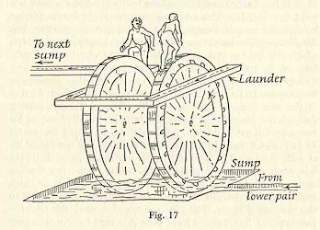
The American Engineers' Council for Professional Development (ECPD, the predecessor of ABET) has defined "engineering" as:
The creative application of scientific principles to design or develop structures, machines, apparatus, or manufacturing processes, or works utilizing them singly or in combination; or to construct or operate the same with full cognizance of their design; or to forecast their behavior under specific operating conditions; all as respects an intended function, economics of operation and safety to life and property.
History
The concept of engineering has existed since ancient times as humans devised fundamental inventions such as the pulley, lever, and wheel. Each of these inventions is consistent with the modern definition of engineering, exploiting basic mechanical principles to develop useful tools and objects.
The term engineering itself has a much more recent etymology, deriving from the word engineer, which itself dates back to 1325, when an engine’er
(literally, one who operates an engine) originally referred to “a constructor of military engines.” In t
his context, now obsolete, an “engine
” referred to a military machine, i.e., a mechanical contraption used in war (for example, a catapult). Notable excep
tions of the obsolete usage which have survived to the present day are military engineering corps, e.g., the U.S. Army Corps of Engineers.
The word “engine” itself is of even older origin,
ultimately deriving from the Latin ingenium (c. 1250), meaning “innate quality, especially mental power, hence a clever invention.”Later, as the design of civilian structures such as bridges and buildings matured as a technical discipline, the term civil engineering[4] entered the lexicon as a way to distinguish between those specializing in the construction of such non-military projects and those involved in the older discipline of military engineering.
One who practices engineering is called an engineer, and those licensed to do so may have more formal designations such as Professional Engineer, Chartered Engineer, IncorporatedEngineer, or European Engineer. The broad discipline of engineering encompasses a range of more specialized subdisciplines, each with a more specific emphasis on certain fields of application and particular areas of technology.
Methodology
Engineers apply the sciences of physics and mathematics to find suitable solutions to problems or to make improvements to the status quo. More than ever, engineers are now required to have knowledge of relevant sciences for their design projects, as a result, they keep on learning new material throughout their career.

If multiple options exist, engineers weigh different design choices on their merits and choose the solution that best matches the requirements. The crucial and unique task of the engineer is to identify, understand, and interpret the constraints on a design i n order to produce a successful result. It is usually not enough to build a technically success ful product; it must also meet further requirements.Constraints may include available resources, physical, imaginative or technical limitations, flexibility for future modifications and additions, and other factors, such as requirements for cost, safety, marketability, productibility, and serviceability. By understanding the constraints, engineers derive specifications for the limits within which a viable object or system may be produced and operated.
Problem solving
Engineers use their knowledge of science, mathematics, and appropriate experience to find suitable solutions to a problem. Engineering is considered a branch of applied mathematics and science. Creating an appropriate mathematical model of a problem allows them to analyze it (sometimes definitively), and to test potential solutions.
Usually multiple reasonable solutions exist, so engineers must evaluate the different design choices on their merits and choose the solution that best meets their requirements. Genrich Altshuller, after gathering statistics on a large number of patents, suggested that compromises are at the heart of "low-level" engineering designs, while at a higher level the best design is one which eliminates the core contradiction causing the problem.
Engineers typically attempt to predict how well their designs will perform to their specifications prior to full-scale production. They use, among other things: prototypes, scale models, simulations, destructive tests, nondestructive tests, and stress tests. Testing ensures that products will perform as expected.Engineers as professionals take seriously theirresponsibility to produce designs that willperform as expected and will not cause unintended harm to the public at large. Engineers typically include a factor of safety in their designs to reduce the risk of unexpected failure. However, the greater the safety factor, the less efficient the design may be.
The study of failed products is known as forensic engineering, and can help the product designer in evaluating his or her design in the light of real conditions. The discipline is of greatest value after disasters, such as bridge collapses, when careful analysis is needed to establish the cause or causes of the failure.
Specialization
There are seven major disciplines within civil engineering that are closely interrelated:
Structural
As a structural engineer, you will face the challenge of designing structures that support their own weight and the loads they carry, and that resist wind, temperature, earthquake, and many other forces. Bridges, buildings,offshore structures, space platforms, amusement park rides, and many other kinds of projects are included within this exciting discipline. You will develop the appropriate combination of steel, concrete, timber, plastic, and new exotic materials. You will do the planning and design, a s well as visit the project site to make sure the work is done properly.
Environmental
The skills of environmental engineers are bec oming increasingly important as we attempt to protect the fragile resources of our planet. Environmental engineers translate physical, chemical, and biological processes into systems to destroy toxic substances, remove pollutants from water, reduce non-hazardous solid waste volumes, eliminate contaminates from the air, and develop groundwater supplies. In this field, you may be called upon to resolve issues of providing safe drinking water, cleaning up sites contaminated with hazardous materials, disposing of wastewater, and managing solid wastes.
physical, chemical, and biological processes into systems to destroy toxic substances, remove pollutants from water, reduce non-hazardous solid waste volumes, eliminate contaminates from the air, and develop groundwater supplies. In this field, you may be called upon to resolve issues of providing safe drinking water, cleaning up sites contaminated with hazardous materials, disposing of wastewater, and managing solid wastes.
Geotechnical engineering is required in all aspects of civil engineering, bec
 ause most projects
ause most projectsare supported by the ground. As a geotechnical engineer, you might develop pr ojects below ground, such as tunnels, foundations, and offshore platforms. You will analyze the properties of soil and rock that support and affect the behavior of these structures. You may evaluate the pot ential settlements of buildings, the stability of slopes and fills, the seepage of ground water and the effects of earthquakes. You will investigate the rocks and soils at a p roject site and determine the best way to support a structure in the ground. You may also take part in the design and construction of dams, embankments, and retaining walls.
Water Resources
water for cities, industry, and irrigation, to treat wastewater, to protect beaches, or to manage and redirect rivers. You might be involved in the design, construction, or maintenance of
hydroelectric power facilities, canals, dams, pipelines, pumping stations , locks, or seaport facilities.
Transportation
Because the quality of a community I directly related to the quality
 of its transportation system,
of its transportation system,your function as a transportation engineer will be to move people, good, and materials safely and efficiently. Your challenge will be to find ways to meet our ever-increasing travel needs on land, air, and sea. You will design, construct, and maintain all types of transportation facilities, including highways, railroads, airfield s, and ports. An important part of transportation
engineering is to upgrade our transportation capability by improving traffic control and mass transit systems, and by introducing high-speed trains, people movers, and other new transportation methods.
Construction
Urban Planning
As a professional in this area, you will be concerned with the entire dev
 elopment of a community. Analyzing a variety of information will help you coordinate projects, su ch as projecting street patters, identifying park and recreation areas, and determining areas f o r industrial and residential growth. To ensure ready access to your community, coordination with other authorities may be required to integrate freeways, airports, and other related facilities. Successful coordination of a project will require you to be people-oriented as well as technically knowledgeable.
elopment of a community. Analyzing a variety of information will help you coordinate projects, su ch as projecting street patters, identifying park and recreation areas, and determining areas f o r industrial and residential growth. To ensure ready access to your community, coordination with other authorities may be required to integrate freeways, airports, and other related facilities. Successful coordination of a project will require you to be people-oriented as well as technically knowledgeable.Employment
According to the U.S. Bureau of Labor Statistics, civil engineers hold about 256,000 jobs. This represents 17% of the 1.5 million jobs held by engineers in the U.S. Employment opportunities for civil engineers exist all over the world. Civil engineers are needed everywhere to plan, design, construct, operate, improve, and renovate the projects essential to modern comfort and growth. Where you work makes a big difference to your career. The key to making a success of a
foreign assignment is being prepared, considering all the issues, and having a clear picture of the benefits.
While there are abundant opportunities to work internationally as a civil engineer, it takes some
special preparation to do well abroad. Speaking more than one language is a major factor.
Being able to adapt to new conditions rapidly is another. Although the international workforce
is becoming more mobile every day, traditionally big engineering firms tend to send
experienced senior level staff on international assignments. Studying abroad is one way to
investigate how interested you are in working internationally. Some form of international work
or study experience is a strong credential for a young civil engineer. Even if you do not want to
work in other countries on a regular basis, understanding engineering from a global
perspective will enhance your ability to complete domestically in what is, increasingly, a world
market.
Career Path Forecast
According to the U.S. Department of Labor, Bureau of Labor Statistics, civil engineers are expected to experience 18 percent employment growth during the projections decade of
2006-2016. This is faster than the average for all occupations. Spurred by general population growth and the related need to improve the Nation’s infrastructure, more civil engineers will be needed to design and construct or expand transportation, water supply, and pollution control systems and buildings and building complexes. They also will be needed to repair or replace existing roads, bridges, and other public structures. Because construction industries and architectural, engineering and related services employ many civil engineers, employment opportunities will vary by geographic area and may decrease during economic slowdowns, when construction is often curtailed.








0 comments:
Post a Comment